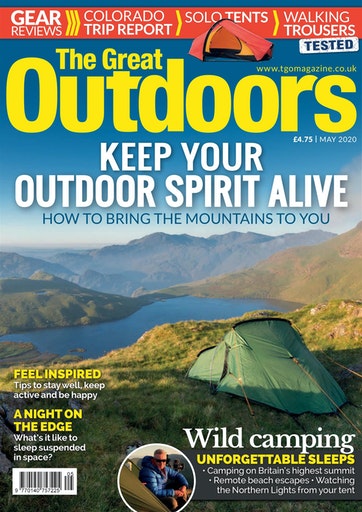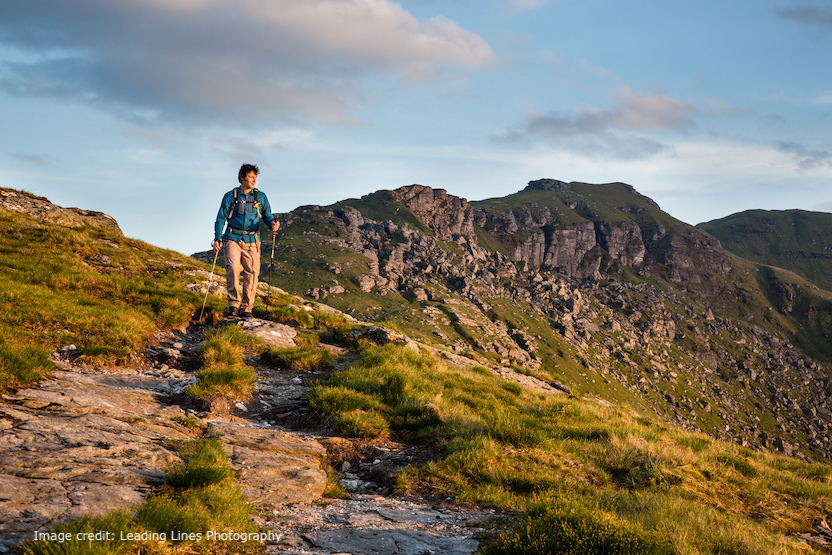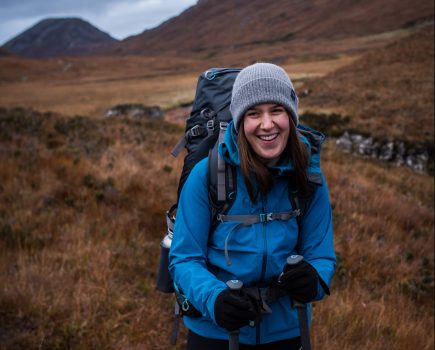We’ve all been looking forward to the moment when we can return to the hills – but is this really it? Here’s the latest advice from outdoors organisations around the UK.
Coronavirus rules were relaxed in England earlier this week, leaving many walkers hopeful for an immediate return to the hills. Unlimited outdoors exercise is now permitted, provided you remain at least two metres apart from anyone outside your household, and travel is unrestricted within England’s borders (but still against the rules in Scotland and Wales – see below for more).
“This may be good news for climbers and walkers but it comes with a strong onus for people to take personal responsibility for social distancing and risk management whilst in the countryside,” says the BMC. “The immediate lifting of travel restrictions also creates significant challenges for landowners and rural communities who have had very little time to prepare for visitors.”
As Mountain Rescue England and Wales CEO Mike France put it: “just because the government says you can go out, it doesn’t mean you should.”
‘Be cautious’
One major concern is the pressure that a rush to mountainous areas could place on Mountain Rescue teams.
#MountainRescue advises caution as lockdown eases in England. Read our full statement here: https://t.co/yaUNH0rtYH pic.twitter.com/Mvve9nTQti
— Mountain Rescue England and Wales (@MountainResqUK) May 12, 2020
“Any surge in visitors and call outs is going to put a huge additional pressure on mountain rescue volunteers, in addition to the extra work of using PPE and stringent cleaning of kit and vehicles,” said France. “…it is essential that everyone heading for the hills takes responsibility for their own safety, and should be aware that mountain rescue response times will be longer because of the additional preparations needed.
“No matter how much exercise people have been taking at home, in their gardens or local to home during lockdown, most of them may not be as hill fit as they were three months ago. Anyone planning a day out in the hills needs to break themselves in gradually, not do too much and plan a route that is well within their current capabilities.”
The BMC has issued similar advice, suggesting that climbers and hill walkers “be cautious, choose objectives within your technical and physical limits to minimise the risk of accidents and injury.”
‘Respect local communities’
The new coronavirus regulations have caused consternation in some rural communities – particularly in the Lake District, which has one of the highest infection rates for Covid-19 in the UK.
Richard Leafe, CEO of the Lake District National Park Authority, has asked visitors to consider staying away for now.
If you’re thinking of visiting the Lake District for exercise, our advice is don’t rush back. We’ll be here for you when all this is over. https://t.co/H6l2VUBhP8
— Richard Leafe (@LakesChief) May 14, 2020
“Following the Government’s announcement that people will be able to travel for exercise from 13th May, we know that many will be keen to visit the Lake District,” he said. “This is understandable for the many physical and mental health benefits the National Park provides. However, sadly Cumbria currently has one of the highest Covid-19 infection rates in the UK, therefore keeping our staff and local communities safe must remain our priority. For example, our mountain rescue teams are made up of volunteers, many of whom work in the NHS and other frontline professions, so we cannot afford to put unnecessary pressure on them. So for now, we’re asking people not to rush back to the Lake District – help protect our communities, the fells will still be here when this passes.
“Campsites, hotels, restaurants and many businesses across the Lake District remain closed. When the time is right, we look forward to welcoming visitors back to the Lake District and have been working with partners to put measures in place that will help keep people safe, such as new car park information and availability to help plan ahead.
“For now, we ask everyone who lives in and visits the Lake District to act responsibly, continue to observe social distancing and stay safe.”
Mountain Rescue teams have also asked the public to stay off the high fells after a huge increase in callouts over the past week.
#LakeDistrict mountain rescuers plea with public to stay off the high fells as the number of callouts since lockdown more than doubles in a week: https://t.co/OyZu6TUCmt
— Mountain Rescue England and Wales (@MountainResqUK) May 15, 2020
The BMC has advised anyone who does visit the Lake District to avoid busy areas, maintain social distancing and be self-reliant both on and off the hill as many local services are still closed. Other suggestions for walkers visiting the Lakes and other rural areas include:
- Be sensitive to your impact on rural communities and landowners: give houses, farm buildings, vehicles and people a wide berth. Help foster good relationships with local communities for the future. Inconsiderate actions will be damaging for all of us.
- Be aware that some car parks may not be open due to staff shortages. Check if it’s feasible to access your planned destination before setting off.
- Check for any specific local advice by visiting relative websites, such as national parks, National Trust, RSPB, Forestry Commission and local authorities, before setting off from home.
In addition, National Parks has issued a four-step guide for people considering visiting a national park in the near future. It advises that visitors observe the following:
- Know and follow the latest Government advice
- Plan ahead – check the latest local information
- If it feels too crowded, it is too crowded
- Be kind out there
Can I wild camp?
Nothing in the new government regulations or advice for England specifically mentions wild camping, but the BMC’s interpretation of the guidelines is that it does not permit overnight stays. Cumbria Police have also issued the following statement:
“Overnight stays away from home are not permitted under Coronavirus Regulations, this includes wild camping. Any members of the public who sees this or encounters problems with such activities should notify the appropriate landowner; Lake District National Park Authority, National Trust, United Utilities or the police and let them deal with this rather than taking any other action.”
❗ PLEASE SHARE ❗
Important information for those thinking of visiting Cumbria.
Stopping overnight is against the current regulations.
For more details on these regulations click here: https://t.co/c5QZ9jG1Z7 pic.twitter.com/CA7O0Y1jUG
— Cumbria Police (@Cumbriapolice) May 14, 2020
The statement has provoked criticism on social media, with some saying that it has no basis in the new government guidelines.
When in Wales…
While Wales has lifted some restrictions on outdoor activity, allowing people to exercise more than once per day provided they observe physical distancing rules, driving to engage in outdoor activity is still not permitted. As the Ramblers puts it: “You must continue to stay local and any exercise should start and end at home and not involve going a significant distance from home.”
Access to the outdoors is changing. However, this is still different in England, Wales & Scotland. In Wales, the emphasis & law is to stay at home unless you have a “reasonable excuse” to do so, & whether you can go climbing or hill-walking is unclear:https://t.co/ewRZaPUTaQ pic.twitter.com/QwWpcgbZ5t
— BMC Access Team (@access_bmc) May 14, 2020
The Welsh government and police forces have made it clear that anybody travelling from England to Wales for exercise will face fines and even court action. If you live in Wales and happen to have a hill at the back of your house, though, are you allowed to climb it?
“The BMC believes that if you are able to access a mountain or hill area directly from your home and that if that area is not within the closed areas of national parks, then there should not be any issues with the activity of hill-walking or low-risk climbing activities and that such individual activity falls within the guidance,” says a BMC statement. “Having said that, the regulations in Wales surrounding social distancing are more stringent, and exercise can only be undertaken alone or with a member of your household. You cannot meet up with another person outside of your home for exercise in Wales and the 2m social distancing regulation is legally enforceable. Gatherings of more than two people are illegal and groups of climbers or boulderers at a climbing venue would attract attention and could involve police action.”
The situation in Scotland
In Scotland, most lockdown regulations still remain in place, although people are now allowed to exercise outdoors whenever they like. Mountaineering Scotland says:
“From 11 May, the Scottish Government have changed the advice on outdoor exercise so that people can go outside more than once a day to exercise. This activity should continue to be undertaken close to home. Those going out to exercise should either go alone or with members of their household.
“The change does not allow people to mix with people from different households, to gather in groups, or to go out to relax outdoors.”
Full advice from the Scottish government can be found here.
Stay local?
Despite relaxed restrictions in England, some outdoors organisations are still advising people to avoid driving for exercise.
The Ramblers says: “In many cases, the best option will be to stay local and explore the local area on foot.”
And the BMC adds: “Where possible, stay local. Whilst this is not part of the government’s guidance, staying local will reduce the load on national parks and rural communities whilst they are sensitive to increased visitor numbers.”
The Great Outdoors will continue to monitor the guidelines and post updates on social media. Got a strong opinion either way? We’d love to hear from you. Find us on Twitter, Facebook and Instagram @TGOMagazine.
Make indoor time better with The Great Outdoors
During the lockdown, we’re continuing to work (from home!) to make a magazine that will help you keep your outdoor spirit alive. Even though you can’t go physically go to the hills and mountains, we aim to take you there with our words and images, and perhaps conjure some of the feelings they inspire.
To show our readers our gratitude for their support at this time, current subscribers have had their subscriptions upgraded to include free access to the digital edition of the magazine.
To give you some great reading material for these indoor days, we’re also offering new readers:
- Three issues of the magazine along with the accompanying digital editions for £9.99 plus free postage, with no ongoing commitment to subscribe.
- Full subscriptions at just £15 for your first six issues.
- Or, if you want to catch up on content you may have missed, you can buy individual back issues with free postage and packaging.
Stay home, stay safe, and see you on the hills when the day comes!







